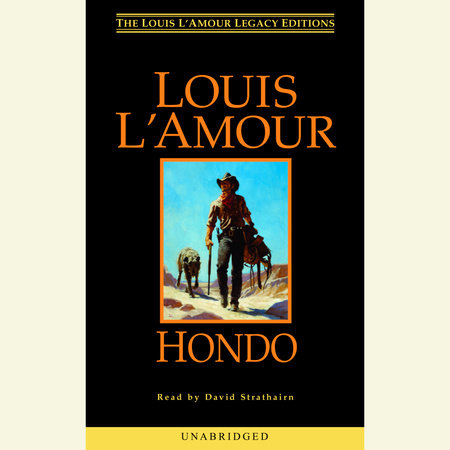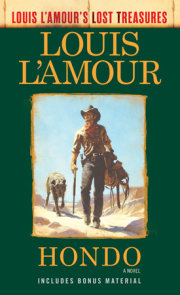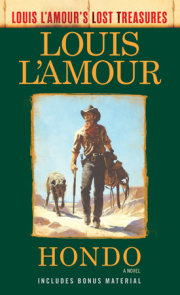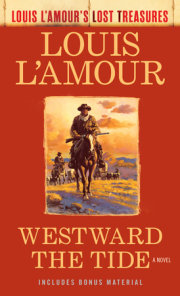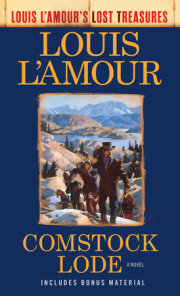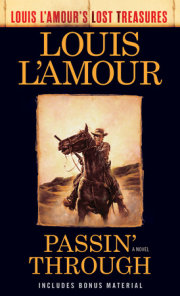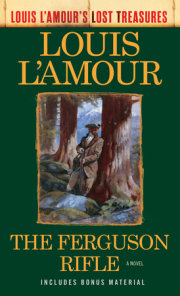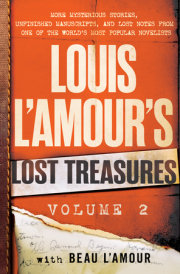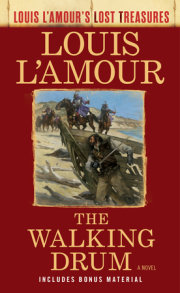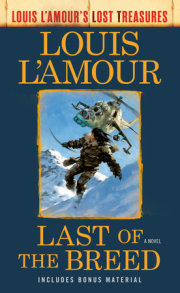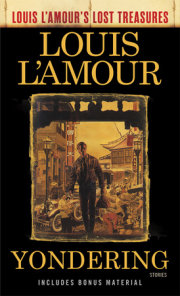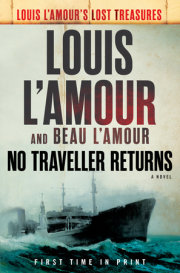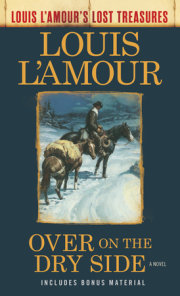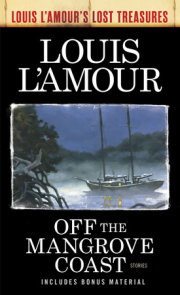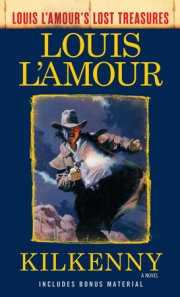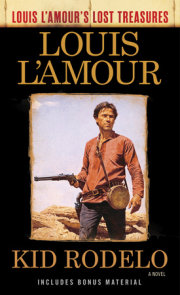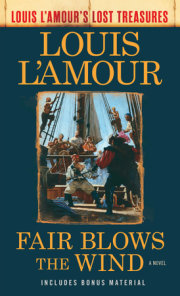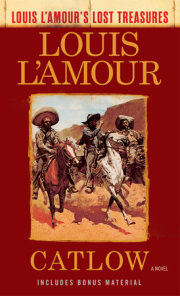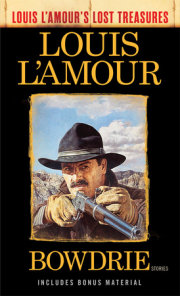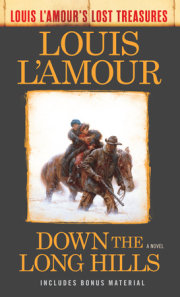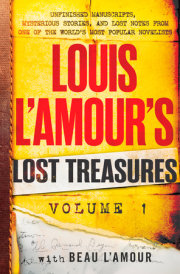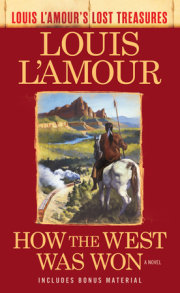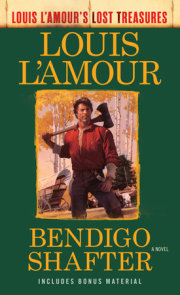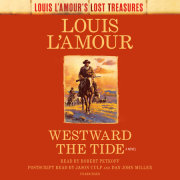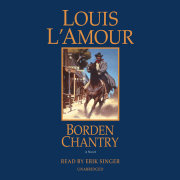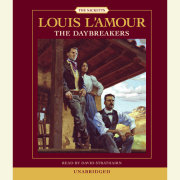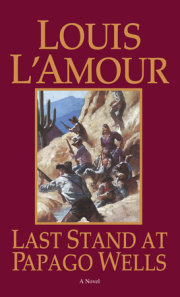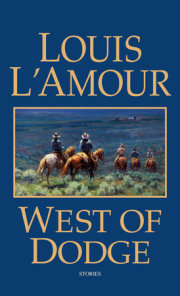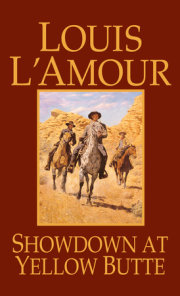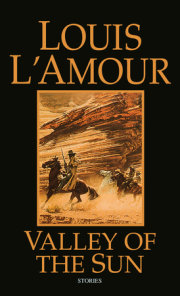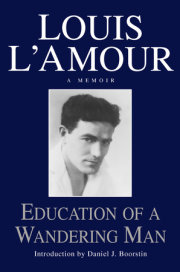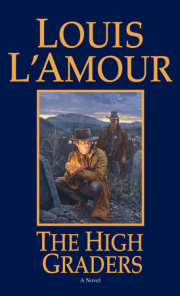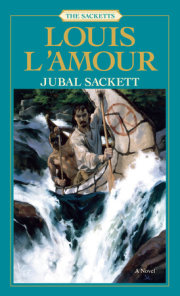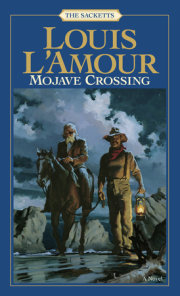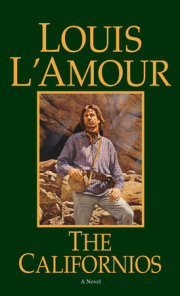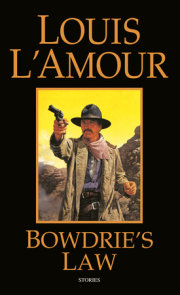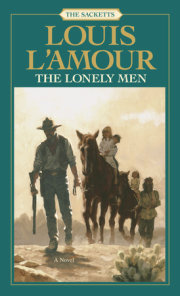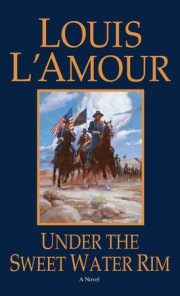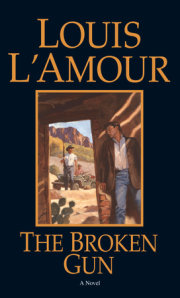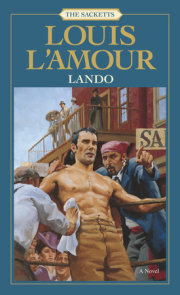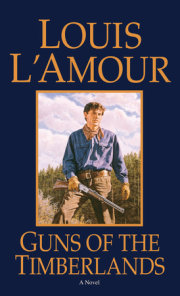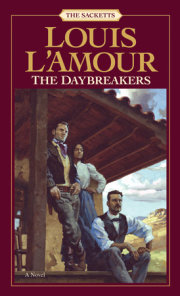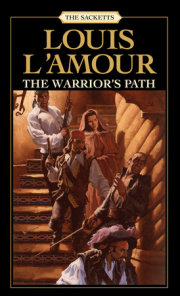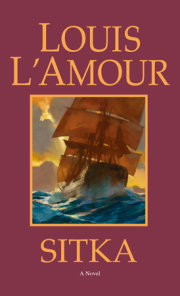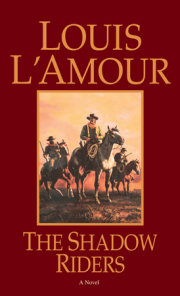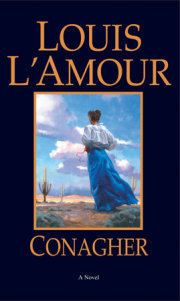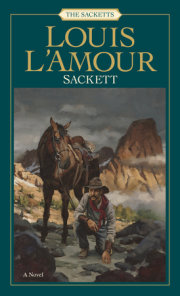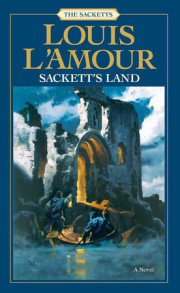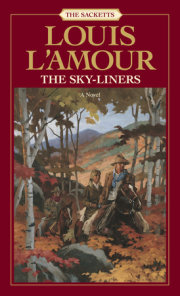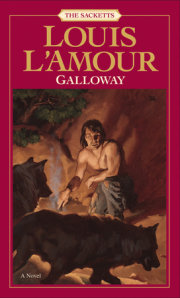Chapter OneHe rolled the cigarette in his lips, liking the taste of the tobacco, squinting his eyes against the sun glare. His buckskin shirt, seasoned by sun, rain, and sweat, smelled stale and old. His jeans had long since faded to a neutral color that lost itself against the desert. He was a big man, wide-shouldered, with the lean, hard-boned face of the desert rider. There was no softness in him. His toughness was ingrained and deep, without cruelty, yet quick, hard, and dangerous. Whatever wells of gentleness might lie within him were guarded and deep.
An hour passed and there was no more dust, so he knew he was in trouble. He had drawn up short of the crest where his eyes could just see over the ridge, his horse crowded against a dark clump of juniper where he was invisible to any eye not in the immediate vicinity.
The day was still and hot. Sweat trickled down his cheeks and down his body under the shirt. Dust meant a dust devil or riders . . . and this had been no dust devil.
The dust had shown itself, continued briefly, then vanished, and that meant that he also had been seen.
If they were white men fearful of attack, they were now holed up in some arroyo. If they were Apaches, they would be trying to close in.
He studied the terrain with care, a searching study that began in the far distance and worked nearer and nearer, missing no rock, no clump of brush, no upthrust ledge. He saw no further dust, heard no sound, detected no movement.
He did not move. Patience at such a time was more than a virtue, it was the price of survival. Often the first to move was the first to die.
Hondo Lane took out the makings and built another cigarette. When he struck the match he held it well back in the foliage of the juniper, keeping the flare invisible. He drew deep on the cigarette, returning his attention to the terrain.
The rough-looking mongrel dog that followed him had lowered himself into the soft earth beneath another juniper a dozen yards away. The dog was a big brute, gaunt from running.
It was hot. A few lost, cotton-ball bunches of cloud drifted in a brassy sky, leaving rare islands of shadow upon the desert’s face.
Nothing moved. It was a far, lost land, a land of beige-gray silences and distance where the eye reached out farther and farther to lose itself finally against the sky, and where the only movement was the lazy swing of a remote buzzard.
His eyes wandered along the ridge. To his right there was a shallow saddle, the logical place to cross a ridge to avoid being skylined. Logical, but obvious. It was the place an Apache would watch.
There were junipers beyond the ridge, and broken boulders upon the ridge itself. In less than a minute he could cross the ridge and be in the shelter of those junipers, and if he took his time and made no sudden moves to attract the eye, he might easily cross the ridge without being seen.
He thought none of this. Rather it was something he knew, something born of years in wild country.
Hondo Lane crossed the ridge into the junipers and hesitated briefly, studying the country. His every instinct told him those riders had been Apaches and that they were somewhere close by. Yet the dog had given no sign.
He eased his weight in the saddle and checked the eagerness of the horse, which smelled the water in the river not far ahead.
Finishing his cigarette, he pinched it out and dropped it to the sand and angled down the slope. He slid his Winchester from its scabbard and rode with it across the saddle, keeping his horse to a walk. Vittoro was off the reservation with his fighting men, and that could mean anything. Council fires burned and there was much coming and going among the lodges. Mescaleros had been hunting with the Mimbreños and the border country was alive with rumors.
Hondo Lane could smell trouble, and he knew it was coming, for others and for himself.
Ahead lay the river, and after the rains it would be running full and part of the crossing would be swimming. Lane liked no part of it. Since the rains he had crossed the trails of four bands of Apaches and they had been riding without their women and children, which meant raiding. Young bucks out to lift some hair or steal horses.
He went down the slope to the river, knowing there was no way of avoiding the crossing. He used every bit of cover and changed direction frequently, heading toward an inviting sand bar that led far out into the stream, yet when he was near it he suddenly switched direction and rode behind a clump of cottonwood and willow, going into the water in the shadow of the trees, and quietly, to make no splash.
The dog went along with him and together they crossed. As the buckskin went up the bank, Hondo heard the twang of a bowstring and felt the buckskin bunch its muscles under the impact of the arrow. As the horse started to fall, Hondo Lane rolled free.
He hit the sand on his shoulder and rolled swiftly behind a drift log. When he stopped rolling he was looking past the butt end of the log with his rifle in position. He saw a movement of brown and his finger tightened and the rifle leaped in his hands. He heard the whop of the striking bullet and saw the Apache roll over, eyes wide to the sun.
As he fired, he moved, getting into a new position in coarse grass with almost no cover. And then he waited.
Hondo dried his sweaty palms on his shirt front and blinked to keep the sweat out of his eyes. The sand was hot beneath him, the sun hot upon his back. He smelled the stale sweat of his body, the smells of tobacco, horse, and greasewood smoke that lived with him. He waited, and there was no sound.
A fly lighted on the back of his hand, he heard the sound of water running over stones. Around him were the gray bones of a long dead tree. His shoulder cramped.
There was no movement; only a small bird started to land in a clump of brush, then veered away. It was a small bunch of brush and Hondo took a chance. He fired suddenly into the brush, spacing his shots. He heard a faint, gasping cry and fired again at the same spot.
Rolling back to his former position, he waited, then looked past the butt of the log. He saw a moccasin toe dig spasmodically into the sand, then he saw it slowly relax.
Two Indians, or more? He lay still, ears alert to sound. The moccasin toe remained as it was. A tiny lizard appeared on a branch near him and stared, wide-eyed. Its tiny heart pounded, its mouth gaped wide with heat. He dried a palm, then flicked a stone into the brush twenty feet away. He heard it fall, and no sound followed.
Probably not more than two. His mouth felt dry and he dearly wanted a drink. Yet he waited, wanting to take no chance, and knowing too well the patience of the Apache.
Only after several minutes did he ease away from the log and circle to get a better look. The Apache lay still, his lower back bathed in blood that glistened redly in the hot afternoon sun.
Hondo Lane got to his feet and moved closer. The bullet had struck the Indian in the chest. It had cut through his body from the top of his chest and had come out in the small of his back, breaking his spine.
Lowering the butt of his rifle, Hondo took off his hat and mopped his brow with a handkerchief. He looked again at the sprawled brown body of the Indian, then glanced over at the other. Both are dead . . . and this was not a good place to be.
The dog stopped under a tree and lowered himself to the ground, watching him. Hondo glanced at his dead horse, then stripped it of saddle, bridle, and saddlebags. It was a load, but swinging them together, he shouldered them and started off through the trees, walking with a steady stride. The dog rose from the ground in one easy movement and started after him.
Reaching the stream at a bend, Hondo Lane walked into the water on an angle that pointed upstream. When he was knee-deep he turned and walked back downstream and stayed with the stream for half a mile, then emerged and kept to rocks along the stream for some distance farther, leaving them finally at a rock ledge. When he left the rock he was again walking upstream. He used every device to hide his trail, changing directions with the skill of an Apache, and finally he reached a ridge, which he followed, just below the crest.
The sun sank and the long shadows crept out from the hills, but Hondo Lane did not rest. He moved on, checking distance by the stars, and continuing along the ridge. When he had walked two hours into the night, he finally lowered his heavy burden to the ground and rubbed his shoulder.
He had come to a halt in a tiny circle of rocks among scattered piñons. The rocks rimmed a cup that sat down at least ten feet lower than the hills around. Unrolling his blankets beneath a tree, he made a quick supper of a piece of hardtack and jerked beef. Then he rolled in his blanket and slept.
At dawn he was awake. He did not awaken gradually, but his eyes opened quickly to consciousness and he listened, then glanced at the dog. It lay some yards away, head resting on paws. Hondo relaxed and swiftly rolled his blankets. After a quick check from the edge of the cup, studying the country, he returned and gathered dry branches from the curl-leaf, a shrub whose branches give off a hot flame and are almost smokeless.
He built a small fire under a piñon so what little smoke there was would be diffused by rising through the branches. He made coffee, ate more jerky and hardtack, then eliminated all evidence of his fire and brushed leaves and sand over the spot. Carefully he removed evidence of his resting place and tracks. Then, shouldering his saddle and saddlebags again, he left the cup and started along the ridge.
The morning air was fresh and cool. He walked with a steady stride, rarely pausing to rest. His lean, wolf-hard body, baked by too many suns and dried by winds, carried no soft flesh to melt away under the sun. At midmorning he heard birds chirping and went toward the sound. A shallow basin in the rock held water. He dropped to his belly and drank, then moved back, and the dog moved in, lapping the water gratefully, but with eyes wary.
Among the rocks near the water Hondo Lane smoked a cigarette and studied the country. There was no movement but an occasional buzzard. Once he saw a lone coyote. He drank again, then shouldered his saddle and moved on.
Once he stopped abruptly. He had found the old track of a shod horse. The track was days old, and from its appearance had been made before the rain. Little was left but the indentations. Thoughtfully he studied the terrain around him. It was an extremely unlikely place for a rider to be. No soldier would be in such a place unless scouting for a larger command.
Shouldering his burden once more, Hondo backtrailed the hoof marks, finding two more tracks, then losing them on lower ground where the rain had washed them out. Finally, making a guess, he quartered on his route and cut across the shallow valley, moving toward a place of vantage from which he could see the country.
He saw a bunch of squaw cabbage and broke off a few stalks and walked on, eating them as he went. Twice more he found isolated tracks of that same shod horse, and then suddenly the dog stiffened.
Hondo eased himself back to the ground. There was sparse grass where he lay, a few scattered chunks of rock. He lowered his saddle among the rocks and lay perfectly still. The dog, a few yards away, lay absolutely immobile. He growled, low and deep.
“Sam!” Hondo’s whisper was quick, commanding. The growl subsided.
Several minutes he lay still, and then he heard the movement. There were nine Apaches, riding in a loose bunch, heading in a direction roughly parallel to his own. He lay still, avoiding looking directly at them for fear of attracting their attention.
Nine. At this distance he wouldn’t have a chance. He might get three or four before they hit him, and then that would be all. Nor was there any shelter here. Only his absolute immobility and the neutral color of his clothing kept him from being seen.
He listened to their movement. They did not talk. He heard the rustle of the horses through the coarse growth, an occasional click of hoof on stone. And then they were gone.
He lay still for several minutes, then got up and cut across their trail, still occupied with those shod hoof tracks. They had all been made at the same time. This meant a white rider had spent some time in the area. He might still be here. One horse could mean another.
A few miles farther and suddenly the cliff broke sharply off and he was looking into a deep basin at the bottom of which lay a small ranch. It was green, lovely, and peaceful, and with a sigh he started down the slope, walking more slowly.
Below him, near the worn poles of the corral, a small boy was playing. Suddenly, attracted by some sound, he lifted his head and looked up the slope at the descending man.
“Mommy! Mommy!”
A woman came to the door of the cabin, shading her eyes against the sun. Then she walked out to the child and spoke to him, and together they watched the man on the hillside. He walked still more slowly, the fatigue of the long days and his heavy burden at last catching up with even his iron strength. She hesitated, then turned quickly and walked back to the cabin.
Hanging in a holster from a peg on the cabin wall was a huge Walker Colt. She lifted the heavy weapon from its holster and walked back to the door, placing it under a dish towel on the table where it would be immediately available.
She put her hand on the child’s head. “You let Mommy do the talking,” she said quietly. “Remember!”
“Yes, Mommy.”
Hondo reached the bottom of the slope and walked slowly toward the cabin. As he drew near his eyes went from the house to the corrals and the open-face shed that sheltered an anvil, a forge, and a few tools. His eyes went beyond, searching, still wary. Not even the presence of the woman and child in the doorway dispelled his suspicion.
“Remember,” the woman whispered, “no talking.”
Hondo lowered his saddle to the ground under the shed and took off his hat as they walked toward him. He mopped his face. “Morning, ma’am. Howdy, son.”
“Good morning. You look like you’ve had trouble.”
“Yep. I lost my horse while I was gettin’ away from Indians a few days ago. Made a dry camp above Lano last night.” He gestured toward the dog. “Then Sam here smelled Apaches, so I thought I’d make some more miles.”
“But why? We’re at peace with the Apaches. We have a treaty.”
Hondo ignored her comment, looking around at the stables. There were several horses in the corral. “Yes, ma’am, and now I’ve got to get me a new horse—borrow or buy one. I’ll pay you in United States scrip. I’m ridin’ dispatch for General Crook. My name’s Lane.”
“I’m Mrs. Lowe. Angie Lowe.”
“Can you sell or hire me a horse, Mrs. Lowe?”
“Of course. But I’ve only got the plow horses and two that are only half broken. The cowboy that was training them for me got hurt and had to go to town.”
They walked toward the corral together. Two of the horses were obviously mustangs, wild and unruly. Hondo Lane moved around, studying them carefully. Both were good animals.
“I’m sorry my husband isn’t here to help you. He’s up in the hills working some cattle. He would pick this day to be away when we have a visitor.”
“I’d enjoy meetin’ him, ma’am.” He glanced toward the boy, who was walking toward Sam. “I wouldn’t pet that dog, son. He doesn’t take to petting. And now, ma’am, if you’ll allow me, I’ll give those horses a try.”
“Of course. And I’ll get you some food. I imagine you’re hungry.”
Lane grinned. “Thank you. I could eat.”
Lane hesitated before going to the corral. There was work that needed to be done around here. The little things that are done by a man constantly living around were undone. The recent rains had run off the barn and started to run back under the foundation timbers, gouging out a hole. Another rain and that hole would be much larger. It should be filled and the water trenched away toward the arroyo.
He rolled a smoke and lighted it, then leaned on the corral bars. The two mustangs moved warily, edging away from the man smell and the strangeness. Both had good lines and showed evidences of speed and power. There was a lineback that he liked, a dusky, powerful horse, still wearing his shaggy winter coat.
Lane went through the bars and into the corral, rope in hand, cigarette dangling from the corner of his mouth. The horses moved away from him, circling against the far side of the small corral. He watched them moving, liking the action of the lineback, and studying the movements of both horses.
He talked quietly to the horses and dropped his cigarette into the dust. He was conscious that the boy was perched on the corral, watching with excitement. Dust arose from the corral, and he shook out a loop. The lineback dun tossed his head and rolled his eyes, moving away from the threat of the loop.
Hondo smiled, liking the horse’s spirit. He spoke softly, then moved in. When he made his throw it was quick, easy, and deft. The loop dropped surely over the bronc’s head, and the horse stopped nervously. He knew the feel of a rope, at least. That much he had learned, even if he had not learned the meaning of a saddle.
Leading him to the corral bars, Hondo talked softly to him, stroking his neck and flanks. The mustang shied nervously, then began to quiet down. Finally he nosed at Hondo curiously, but shied when Hondo reached for his nose.
Making no quick movements, Hondo walked to the bars and crawled through. When he had his saddle and bridle he walked back, dropped them near the horse, talked to him a little, and then after rubbing his hand over the dun’s back he put the saddle blanket on him. Then the saddle. The horse fought the bit a little, but accepted it finally.
Once, glancing toward the house, he saw Angie Lowe watching from the doorway.
Leaving the saddle and bridle on the horse so the animal could get used to them, Hondo left the corral. He stood beside the boy, letting his eyes trace the line of the hills. It was amazing to find this woman and her child here, in Apache country.
Suddenly curious, he walked toward the stable, then circled around the bank of the stream and back to the house. The only horse tracks entering or leaving since the rain were his own. Thoughtfully he studied the hills again, and, turning, walked back to the house.
There was a tin washbasin on a bench beside the door, a clean towel and a bar of homemade soap beside it. Removing his hat and shirt, he washed, then combed his hair. Donning the shirt again, he stepped inside.
“Smells mighty good, ma’am,” he said, glancing at the stove. “Man gets tired of his own fixin’.”
“I’m sorry my husband picked today to go hunting those lost calves. He would have enjoyed having a man to talk to. We welcome company.”
Lane pulled back a chair and sat down opposite the plate and cup. “Must be right lonely here. Specially for a woman.”
“Oh, I don’t mind. I was raised here.”
Sam came up to the door and hesitated, then came inside, moving warily. After a minute he lay down, but he kept his attention on Hondo. He seemed somehow remote and dangerous. There was nothing about the dog to inspire affection, except, perhaps, his very singleness of purpose. There was a curious affinity between man and dog. Both were untamed, both were creatures born and bred to fight, honed and tempered fine by hot winds and long desert stretches, untrusting, dangerous, yet good companions in a hard land.
“What can I feed your dog?”
“Nothin’, thanks. He makes out by himself. He can outrun any rabbit in the territory.”
“Oh, it’s no trouble at all.” She turned back to the stove and picked up a dish, looking around for scraps.
“If you don’t mind, ma’am, I’d rather you didn’t feed him.”
Curiously she looked around. The more she saw of this man, the more she was impressed by his strangeness. Yet oddly enough, she felt safer with him here. And he was unlike anyone she had ever known, even in this country of strange and dangerous men.
Even when he moved there was a quality of difference about him. Always casually, always lazily, and yet with a conservation of movement and a watchfulness that belied his easy manner. She had the feeling that he was a man that lived in continual expectation of trouble, never reaching for it, yet always and forever prepared. Her eyes dropped to the worn holster and the polished butt of the Colt. Both had seen service, and the service of wear and use, not merely of years.
“Oh, I think I understand. You don’t want him to get in the habit of taking food from anyone but you. Well, I’ll just fix it and you can hand it to him.”
“No, ma’am. I don’t feed him either.”
When her eyes showed their doubt, he said, “Sam’s independent. He doesn’t need anybody. I want him to stay that way. It’s a good way.”
He helped himself to another piece of meat, to more potatoes and gravy.
“But everyone needs someone.”
“Yes, ma’am.” Hondo continued eating. “Too bad, isn’t it?”
She moved back to the stove and added a stick of wood. She was puzzled by him, yet there was a curious attraction, too. Was it simply that he was a man? That the woman in her needed his presence here? That the place had been needing a man too long?
She stirred up the fire, turned over a charred stick, and moved back to the table. He ate slowly and quietly, not talking, yet without the heedlessness of manner of so many Western men, accustomed as they were to living in camps and bunkhouses and away from the nearness of women.
His boots were worn and scuffed. And there was a place on his left thigh where the jeans had been polished by the chafing of some object. A place that might have been made by a holster. Only this man wore his gun on his right side. Had he, then, worn two guns? It was unlikely. Not many men did.
“You’re a good cook, ma’am.” Hondo pushed back from the table and got to his feet.
“Thank you.” She was pleased, and showed it. She smoothed her one good apron with her hands.
“A woman should be a good cook.”
He walked to the door and hesitated there, looking out over the yard, then at the trees, the arroyo, and finally the hills. As he did this he stood just within the door, partly concealed from the outside by the doorjamb. Then he put on his hat, and turning he said, “I’m a good cook myself.”
Copyright © 2004 by Louis L'Amour. All rights reserved. No part of this excerpt may be reproduced or reprinted without permission in writing from the publisher.

